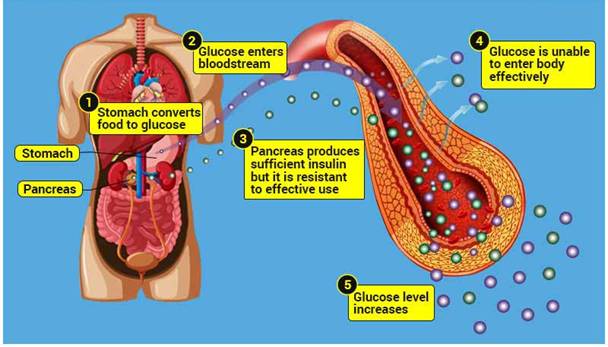A nurse is caring for a client with diabetes mellitus who is prescribed regular insulin via a sliding scale. After administering the correct dose at 0715, the nurse should ensure the client receives breakfast at which of the following times?
0730
0745
0815
0720
The Correct Answer is A
Choice A reason:
0730: Regular insulin, also known as short-acting insulin, typically begins to work within 30 minutes after administration. Therefore, ensuring the client receives breakfast at 0730, which is 15 minutes after the insulin dose, aligns with the onset of insulin action. This timing helps to prevent hypoglycemia by ensuring that glucose from the meal is available when the insulin starts to lower blood sugar levels.
Choice B reason:
0745: Administering breakfast at 0745, which is 30 minutes after the insulin dose, might be slightly delayed. While it is still within the effective window, it is better to have the meal a bit earlier to ensure that glucose is available as soon as the insulin begins to act.
Choice C reason:
0815: Providing breakfast at 0815, which is an hour after the insulin dose, is too late. By this time, the insulin would have already started to lower blood glucose levels significantly, increasing the risk of hypoglycemia. It is crucial to match the timing of food intake with the insulin action to maintain stable blood sugar levels.
Choice D reason:
0720: Serving breakfast at 0720, which is only 5 minutes after the insulin dose, is too early. The insulin would not have started to act yet, and the blood glucose levels might rise too high before the insulin begins to lower them. It is important to wait at least 15-30 minutes after administering regular insulin before eating.

Nursing Test Bank
Naxlex Comprehensive Predictor Exams
Related Questions
Correct Answer is A,B,C,D,E
Explanation
- a) Inspect the abdomen for skin integrity: The first step in an abdominal assessment is inspection. The nurse should visually examine the abdomen for any abnormalities such as skin changes, scars, distention, or masses.
- b) Ask the client about having a history of abdominal pain: Gathering a history of abdominal pain is crucial as it provides context for the physical findings. This step helps identify any underlying conditions that may influence the assessment.
- c) Auscultate the abdomen for bowel sounds: Auscultation should be performed before palpation and percussion to avoid altering the bowel sounds. The nurse listens for the presence, frequency, and character of bowel sounds in all four quadrants.
- d) Percuss the abdomen in each of the four quadrants: Percussion helps to assess the presence of fluid, air, or masses in the abdomen. The nurse taps on the abdomen to listen for sounds that indicate the underlying structures.
- e) Palpate the abdomen gently for tenderness: Palpation is the final step and involves gently pressing on the abdomen to check for tenderness, masses, or organ enlargement. This step should be done last to avoid causing discomfort or altering the findings of the other steps.
Correct Answer is D
Explanation
Choice A Reason:
Constipation is not typically associated with hyperthyroidism. Hyperthyroidism usually speeds up the body’s metabolism, leading to symptoms like increased bowel movements or diarrhea rather than constipation.
Choice B Reason:
Sensitivity to cold is more commonly associated with hypothyroidism, where the body’s metabolism slows down. In hyperthyroidism, patients often experience heat intolerance due to an increased metabolic rate.
Choice C Reason:
Weight gain of 4.5 kg (10 lbs) in 3 weeks is also more indicative of hypothyroidism. Hyperthyroidism generally causes weight loss despite an increased appetite because of the accelerated metabolism.
Choice D Reason:
Frequent mood changes are a common symptom of hyperthyroidism. The excess thyroid hormones can affect the nervous system, leading to symptoms such as anxiety, irritability, and mood swings.
Whether you are a student looking to ace your exams or a practicing nurse seeking to enhance your expertise , our nursing education contents will empower you with the confidence and competence to make a difference in the lives of patients and become a respected leader in the healthcare field.
Visit Naxlex, invest in your future and unlock endless possibilities with our unparalleled nursing education contents today
Report Wrong Answer on the Current Question
Do you disagree with the answer? If yes, what is your expected answer? Explain.
Kindly be descriptive with the issue you are facing.
